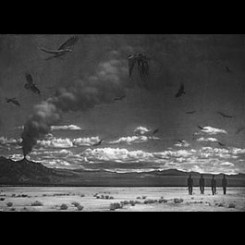Yet the work does not present itself as a clear allegory but rather as a vision of a world adrift. Throughout the disjointed scenes of the film, we are treated to a vision of a world without time, where neoclassical architecture coexist with television, steam-powered trains, and steampunk-inspired flying machines. Large menacing insects hover about, in one scene even sucking on a miniature globe; isolated humans interact in clamor, or in a shrieking chorus, or in aimless crowds, but never talk; strange flying machines periodically drop leaflets from above the clouds; dark smoke billows from trains, factories, and volcanoes; and the magician makes an appearance, pulling insects out of his hat, before we cut to an image of Tiananmen Square. The stark film noir contrasts are enlivened only by scenes of white clouds in the sky, while the haunting, chromatically dissonant musical score reinforces the sense of unease—the sense of uneasy normalcy where humans continue on their business, oblivious of the darkness around. The film finally closes the circle with a scene of a man sobbing on the seashore, looking at the distant lighthouse in vain, and wails in misery. Has he awakened and noticed the misery? The film ends on this uncertain note.
While Sun Xun claims not to have a political focus, the satiric implications of a Great Magician are all too clear in a country with limited free expression of speech, a history of brainwashing through propaganda, and a cowed populace that has largely lost its spiritual and ethical bearings. There is certainly a clear political vein—indeed, in one very short scene, one sees the magician figure on top of an alternate Monument to the People Heroes, which in our world stands in Tiananmen Square. But “21G” is no clear-cut morality tale: by creating an Other Space, a heterotopia, that offers an excess of interpretation, Sun Xun is political in an altogether other way—a mythic, poetic, visionary politics that holds a distorted mirror to the viewer’s eyes and invites the viewer to create meaning by reflecting on the human condition and the madness of our world.
1. “21 Grams,” www.abc.net.au ,accessed December 2, 2010.
2. “21 KE,” ShanghART, accessed December 2, 2010.
3. Vladimir Nabokov, Lectures on Literature, page 4, 1980.
